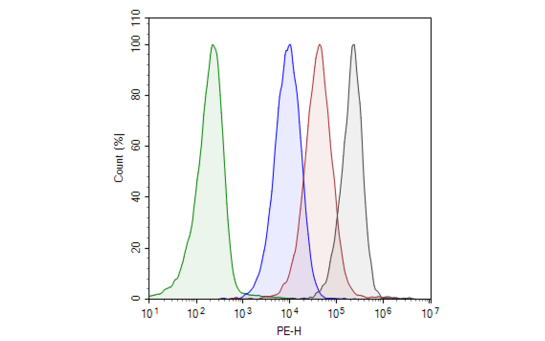NCAM1 (CD56) CHO Cell Line (High, Medium, or Low Expression)
Recombinant clonal CHO-K1 stable cell line constitutively expressing full-length human NCAM1 protein (Neural cell adhesion molecule 1, also known as CD56, single-pass type I membrane protein, isoform 1- Seq ID: NM_000615).
The NCAM1 (CD56) CHO cell line is provided as three different stable, clonal cell lines. Each cell line was selected for different levels of NCAM1 expression: low (L), medium (M) or high (H). Variable expression levels are advantageous for validating antibodies or compounds in binding assays. A drug discovery program may find value in owning all three clones with differential expression of NCAM1. The surface expression of NCAM1 in each cell line was validated in parallel by flow cytometry.
Purchase of this cell line is for research purposes only; commercial use requires a separate license. View the full terms and conditions.
| Name | Ordering Information |
| Thaw Medium 3 | BPS Bioscience #60186 |
| Growth Medium 3D | BPS Bioscience #79539 |
The cell line has been screened to confirm the absence of Mycoplasma species.
NCAM1 (Neural cell adhesion molecule 1), otherwise known as CD56 (Cluster of Differentiation 56), is a cell surface antigen, glycoprotein and member of the immunoglobulin (Ig) superfamily. Transmembrane isoforms of NCAM1 fulfill their functionality through cell-cell and cell-matrix interactions via homophilic binding (in cis and in trans), as well as via heterophilic binding to extracellular matrix factors such as fibroblast growth factor receptors and N-cadherin. Each of these interactions elicit intracellular signaling cascades toward effector function.
NCAM1 is prominently known for its roles in nervous system development; specifically, neurite outgrowth, cell migration and synaptic plasticity. Decreased NCAM1 levels in serum are associated with cognitive impairment in vascular dementia. NCAM1 is upregulated in ischemic cardiomyopathy (ICM) models. Importantly, NCAM1 supports immune surveillance through expansion of T and B lymphocyte and natural killer (NK) cells. NCAM1/CD56 is the archetypal phenotypic marker for NK cells, and has also been found on subsets of CD4+ and CD8+ T cells. Deficiencies in CD56+ immune cells have been associated with specific infections and autoimmune diseases. NCAM1 expression is altered in hematological malignancies, such as multiple myeloma and leukemia, and solid tumors from various tissue types. It has been suggested that NCAM1 expression in acute myeloid leukemia (AML) promotes chemotherapy resistance, and therefore may guide alternative treatment decisions in patients.


